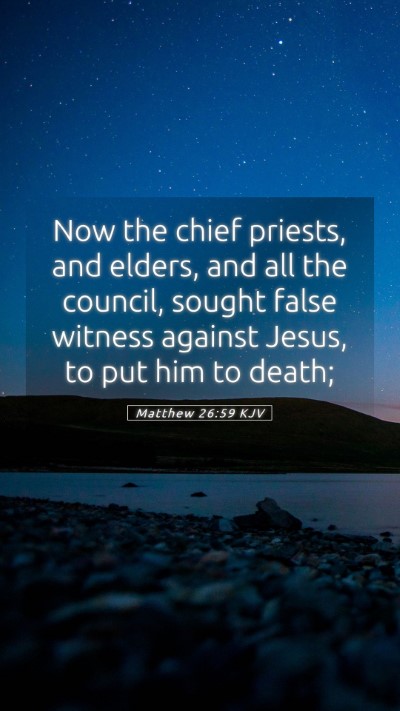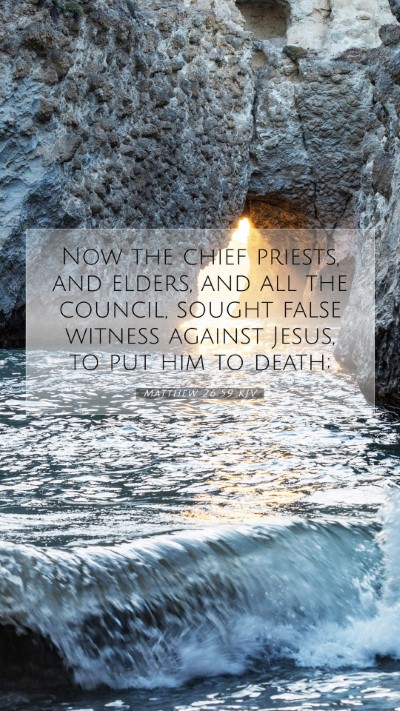Bible Verse Meaning: Matthew 26:59
Verse Reference: Matthew 26:59 - "Now the chief priests, the elders, and all the council sought false testimony against Jesus to put Him to death."
Introduction
This verse highlights the intense scrutiny and deep-seated animosity the religious leaders held toward Jesus. As we explore the meaning of this Bible verse, we will see how this event reveals crucial insights into the nature of legal injustice and the fulfillment of prophetic scripture.
Overview of the Scene
Matthew 26:59 occurs in the context of Jesus' trial before the Sanhedrin, where the governing Jewish council seeks a reason to condemn Him. The mention of "false testimony" emphasizes the moral decay present among the leaders who should have been examples of truth and righteousness.
Commentary Insights
-
Matthew Henry's Commentary:
Matthew Henry points out that the religious leaders' desperate search for false witnesses underscores their corrupt intentions. Their eagerness to condemn Jesus contrasts with their judicial responsibility to uphold truth and justice, reflecting the human tendency to prioritize personal interest over righteousness.
-
Albert Barnes' Commentary:
According to Barnes, this verse illustrates the lengths to which the chief priests and council would go to achieve their goals. They sought testimonies that were false, indicating a well-planned conspiracy against Jesus. This demonstrates not only the injustice of the trial but also serves as a foreshadowing of the false accusations Jesus would face throughout His ministry.
-
Adam Clarke's Commentary:
Clarke notes the significance of the council's actions in seeking false witnesses. He highlights that their motivations were driven by envy and fear of Jesus’ growing influence among the people. The deception they employed marks a direct violation of the commandments regarding bearing false witness, illustrating the depth of their moral corruption.
Understanding the Historical Context
The historical setting is crucial for bible study insights. The Sanhedrin, comprised of the chief priests and elders, had significant religious authority. Their efforts to find grounds for Jesus' execution illustrate a pivotal moment in both Jewish and Christian history, marking a turning point that ultimately leads to the crucifixion.
Importance in Scripture and Theology
This verse can be analyzed from a theological perspective, demonstrating how Jesus willingly submitted to this injustice as part of God’s redemptive plan. The search for false testimony foreshadows the ultimate sacrifice of Christ, as seen in Isaiah 53:7, which foretells that He would be led like a sheep to the slaughter.
Practical Application
For those involved in bible study groups or looking for bible study resources, this verse serves as a poignant reminder of the importance of integrity and the danger of allowing personal animosities to lead to unjust actions. Jesus’ unjust treatment challenges us to seek truth and fairness in our lives and interactions.
Cross References
- Isaiah 53:7 - Highlights Jesus as the suffering servant.
- Matthew 5:11-12 - Encourages us to rejoice when falsely accused for righteousness' sake.
- John 19:7 - The claim of the Jewish leaders that Jesus committed blasphemy.
Conclusion
Matthew 26:59 serves as a powerful illustration of the moral failures of the religious leaders of the time. Their actions not only led to the unjust execution of Christ but also left a lasting lesson on the importance of truth in our lives. By understanding this verse through various bible verse interpretations and commentaries, we can grasp the depth of its meaning and significance in our journey of faith.


